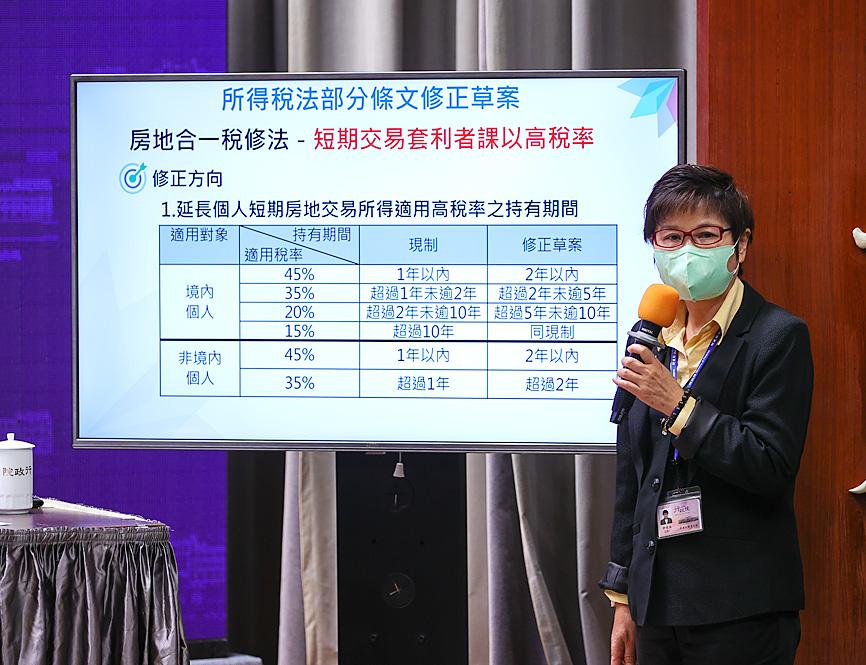The Executive Yuan yesterday approved amendments to the Income Tax Act (所得稅法) that would, if passed by the Legislative Yuan, slap a 45 percent income tax on individuals or legal entities selling real estate before owning it for two years.
The amendments would crack down on real-estate speculation, in the hope of realizing housing justice, Premier Su Tseng-chang (蘇貞昌) told a meeting of the Executive Yuan.
The existing act levies a 45 percent income tax on the sale of a property owned for less than one year, and a 35 percent income tax on the sale of a property owned for more than one year, but less than two.

Photo: CNA
In the act, the sale of a property owned for more than two years, but less than 10 is taxed at 20 percent, while a property owned for more than 10 years is taxed at 15 percent.
For residents of Taiwan, the amendments approved by the Cabinet apply the 45 percent income tax to the sale of properties owned for less than two years, not one, and apply the 35 percent income tax to the sale of properties owned for two to five years, rather than two to 10 years.
For those living abroad, the amendments apply the 45 percent income tax to the sale of properties owned for less than two years, but then apply the 35 percent income tax to the sale of properties owned for two or more years, rather than limiting it to 10 years.
Taiwan-based for-profit companies that sell a property owned for less than two years would pay a 45 percent income tax, while they would pay a 35 percent income tax on the sale of a property owned for two to five years.
Such companies would pay a 20 percent income tax on the sale of a property owned for more than five years.
However, the first-time sale of a building constructed by the company, as well as the plot of land it sits on, would be subject to a 20 percent income tax, the amendments say.
For-profit companies not based in Taiwan would pay a 45 percent income tax for the sale of all properties owned for less than two years, and a 35 percent income tax for the sale of all properties owned for more than two years.
Democratic Progressive Party Legislator Wu Ping-jui (吳秉叡), a member of the Legislative Yuan’s Finance Committee, voiced his support for the bill, saying that it is appropriate for investors who stand to benefit from real-estate speculation to pay higher income taxes.
Chinese Nationalist Party (KMT) Legislator William Tseng (曾銘宗), who is the committee’s convener, said that a unified income tax on buildings and land has been in effect since 2016, but that is has clearly been ineffective, as evidenced by the increasing number of sales involving properties owned for one or two years.
Tseng also urged the Executive Yuan to expedite a draft act that is to serve as a legal basis for taxing owners of multiple properties so that real-estate speculation can be curbed.

The US government has signed defense cooperation agreements with Japan and the Philippines to boost the deterrence capabilities of countries in the first island chain, a report by the National Security Bureau (NSB) showed. The main countries on the first island chain include the two nations and Taiwan. The bureau is to present the report at a meeting of the legislature’s Foreign Affairs and National Defense Committee tomorrow. The US military has deployed Typhon missile systems to Japan’s Yamaguchi Prefecture and Zambales province in the Philippines during their joint military exercises. It has also installed NMESIS anti-ship systems in Japan’s Okinawa

‘WIN-WIN’: The Philippines, and central and eastern European countries are important potential drone cooperation partners, Minister of Foreign Affairs Lin Chia-lung said Minister of Foreign Affairs Lin Chia-lung (林佳龍) in an interview published yesterday confirmed that there are joint ventures between Taiwan and Poland in the drone industry. Lin made the remark in an exclusive interview with the Chinese-language Liberty Times (the Taipei Times’ sister paper). The government-backed Taiwan Excellence Drone International Business Opportunities Alliance and the Polish Chamber of Unmanned Systems on Wednesday last week signed a memorandum of understanding in Poland to develop a “non-China” supply chain for drones and work together on key technologies. Asked if Taiwan prioritized Poland among central and eastern European countries in drone collaboration, Lin

ON ALERT: Taiwan’s partners would issue warnings if China attempted to use Interpol to target Taiwanese, and the global body has mechanisms to prevent it, an official said China has stationed two to four people specializing in Taiwan affairs at its embassies in several democratic countries to monitor and harass Taiwanese, actions that the host nations would not tolerate, National Security Bureau (NSB) Director-General Tsai Ming-yen (蔡明彥) said yesterday. Tsai made the comments at a meeting of the legislature’s Foreign Affairs and National Defense Committee, which asked him and Minister of National Defense Wellington Koo (顧立雄) to report on potential conflicts in the Taiwan Strait and military preparedness. Democratic Progressive Party (DPP) Legislator Michelle Lin (林楚茵) expressed concern that Beijing has posted personnel from China’s Taiwan Affairs Office to its

BACK TO WORK? Prosecutors said they are considering filing an appeal, while the Hsinchu City Government said it has applied for Ann Kao’s reinstatement as mayor The High Court yesterday found suspended Hsinchu mayor Ann Kao (高虹安) not guilty of embezzling assistant fees, reducing her sentence to six months in prison commutable to a fine from seven years and four months. The verdict acquitted Kao of the corruption charge, but found her guilty of causing a public official to commit document forgery. The High Prosecutors’ Office said it is reviewing the ruling and considering whether to file an appeal. The Taipei District Court in July last year sentenced Kao to seven years and four months in prison, along with a four-year deprivation of civil rights, for contravening the Anti-Corruption